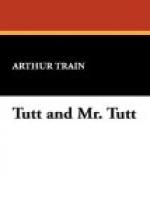“Um!” remarked Mr. Tutt. “Who invited you to testify in this case?”
“Mr. Mooney.”
“Oh, you’re a friend of Mooney’s! That is all!”
Now it is apparent from these questions and answers that Mr. Burke had testified to nothing to his discredit and had conducted himself as a gentleman and a sportsman according to his best lights. Yet owing to the subtle suggestions contained in Mr. Tutt’s inflections and demeanor the jury leaped unhesitatingly to the conclusion that here was a man so ignorant and debased that if he were not deliberately lying he was being made a cat’s-paw by the police in the interest of the On Gee Tong.
Miss Malone fared even worse, for after a preliminary skirmish she flatly refused to give Mr. Tutt or the jury any information whatever regarding her past life, while Mooney, of course, labored from the beginning to the end of his testimony under the curse of being a policeman, one of that class whom most jurymen take pride in saying they hold in natural distrust. In a word, the white witnesses to the dastardly murder of Quong Lee created a general impression of unreliability upon the minds of the jury, who wholly failed to realize the somewhat obvious truth that the witnesses to a crime in Chinatown will naturally if not inevitably be persons who either reside in or frequent that locality.
Twenty-four days had now been consumed in the trial, and as yet no Chinese witnesses except Ah Fong had been called. Now, however, they appeared in cohorts. Though Mooney had sworn that the streets were practically empty at the time of the homicide forty-one Chinese witnesses swore positively that they had been within easy view, claiming variously to have been behind doors, peeking through shutters, at upper windows and even on the roofs. All had identified Mock Hen as the murderer, and none of them had ever heard of either the On Gee or the Hip Leong Tong! Mr. Tutt could not shake them upon cross-examination, and O’Brien began to show signs of renewed confidence. Each testified to substantially the same story and they occupied seventeen full days in the telling, so that when the prosecution rested, forty-two days had been consumed since the first talesman had been called. The trial had sunk into a dull, unbroken monotony, as Mr. Tutt said, of the “vain repetitions of the heathen.” Yet the police and the district attorney had done all that could reasonably have been expected of them. They were simply confronted by the very obvious fact—a condition and not a theory—that the legal processes of Anglo-Saxon jurisprudence are of slight avail in dealing with people of another race.
Now it is possible that even had Mr. Tutt put in no defense whatever the jury might have refused to convict, for there was a curious air of unreality surrounding the whole affair. It all seemed somehow as if—assuming that it had ever taken place at all—it had occurred in some other world and in some other age. Perhaps under what might have been practically a direction of the court a verdict of conviction might have been returned—but it is doubtful. The more witnesses testified to exactly the same thing in precisely the same words the less likely it appeared to be.




